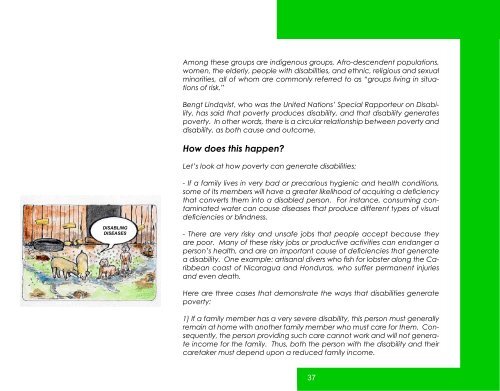in English - Handicap International
in English - Handicap International
in English - Handicap International
Create successful ePaper yourself
Turn your PDF publications into a flip-book with our unique Google optimized e-Paper software.
Among these groups are <strong>in</strong>digenous groups, Afro-descendent populations,<br />
women, the elderly, people with disabilities, and ethnic, religious and sexual<br />
m<strong>in</strong>orities, all of whom are commonly referred to as “groups liv<strong>in</strong>g <strong>in</strong> situations<br />
of risk.”<br />
Bengt L<strong>in</strong>dqvist, who was the United Nations’ Special Rapporteur on Disability,<br />
has said that poverty produces disability, and that disability generates<br />
poverty. In other words, there is a circular relationship between poverty and<br />
disability, as both cause and outcome.<br />
How does this happen?<br />
Let’s look at how poverty can generate disabilities:<br />
- If a family lives <strong>in</strong> very bad or precarious hygienic and health conditions,<br />
some of its members will have a greater likelihood of acquir<strong>in</strong>g a deficiency<br />
that converts them <strong>in</strong>to a disabled person. For <strong>in</strong>stance, consum<strong>in</strong>g contam<strong>in</strong>ated<br />
water can cause diseases that produce different types of visual<br />
deficiencies or bl<strong>in</strong>dness.<br />
DISABLING<br />
DISEASES<br />
- There are very risky and unsafe jobs that people accept because they<br />
are poor. Many of these risky jobs or productive activities can endanger a<br />
person’s health, and are an important cause of deficiencies that generate<br />
a disability. One example: artisanal divers who fish for lobster along the Caribbean<br />
coast of Nicaragua and Honduras, who suffer permanent <strong>in</strong>juries<br />
and even death.<br />
Here are three cases that demonstrate the ways that disabilities generate<br />
poverty:<br />
1) If a family member has a very severe disability, this person must generally<br />
rema<strong>in</strong> at home with another family member who must care for them. Consequently,<br />
the person provid<strong>in</strong>g such care cannot work and will not generate<br />
<strong>in</strong>come for the family. Thus, both the person with the disability and their<br />
caretaker must depend upon a reduced family <strong>in</strong>come.<br />
37

















